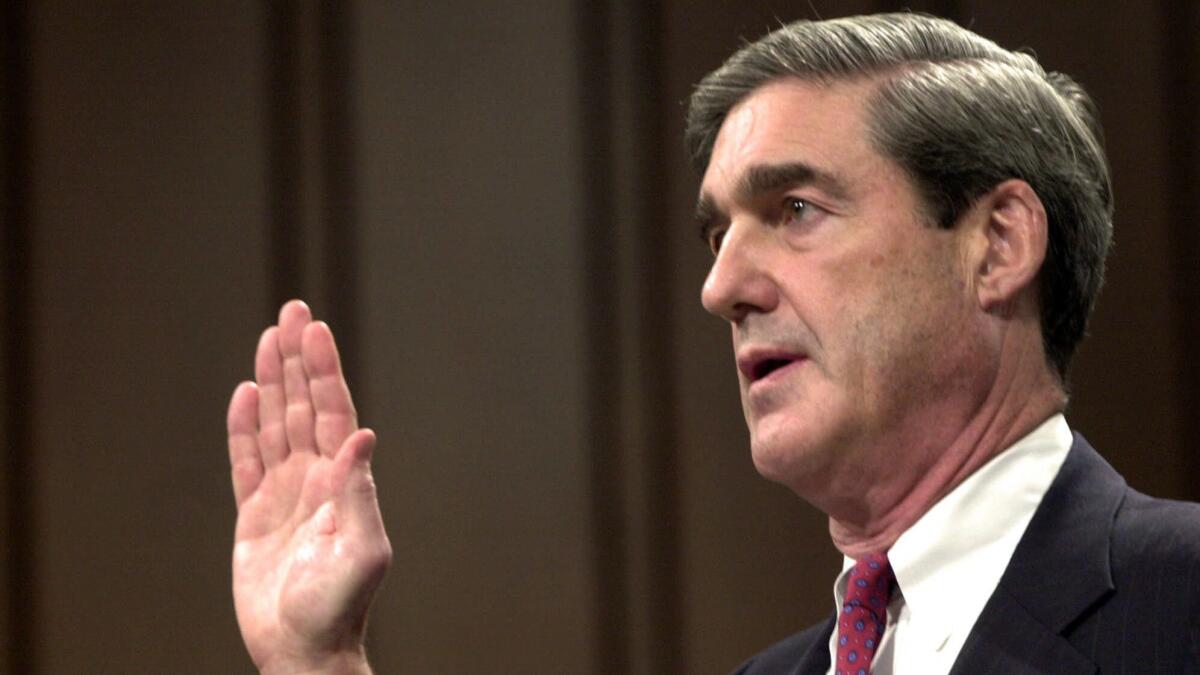Op-Ed: Here is whatâs it like to have a special counsel, like Robert Mueller, hounding you

Ever wondered what itâs like to be pursued, badgered and threatened legally by a special counsel, like the one appointed last week to investigate the Trump campaignâs ties to Russia? I can tell you firsthand.
In 2003, the George W. Bush administration leaked the name of a CIA operations officer, Valerie Plame, to syndicated columnist Robert Novak. A week later my Newsday colleague Knut Royce and I wrote a story disclosing that Plame had worked undercover â Novak had assumed she was simply an analyst. So when the Justice Department tapped a special counsel to look into the matter, he turned to us first.
The counsel, Patrick Fitzgerald, first tried sweet-talking our lawyers, saying he did not need us to name our sources, just to specify how many sources we had and when we had talked to them. No deal!
Then he did something diabolically clever. He got everyone who could possibly have been a source to sign a waiver of confidentiality, then claimed Knut and I could no longer claim reportersâ privilege. This got some traction with our lawyers, but Knut and I were not going to let coercion stop us from protecting our sources.
I had to ready my family for the possibility that I would go to jail and even lose my job in the bargain.
I had been through this before, when the U.S. Senate appointed a special counsel in 1991 to investigate my story in Newsday that Anita Hill had accused Supreme Court nominee Clarence Thomas of sexual harassment. But things had changed dramatically. A decade later, newspaper lawyers were worrying about the bottom line as well as the 1st Amendment, and the legal protections for journalists had been seriously diminished.
Fitzgerald threatened us with a subpoena, provoking a nasty internal dispute at Newsday about cooperation. The deputy attorney general who appointed him, the same James B. Comey who was just fired as head of the FBI by President Trump, called Fitzgerald âEliot Ness with a Harvard law degree.â Someone else called him a âbulldog.â
He certainly pursued us like one, though he eventually decided we were not essential to his case and let it drop. Later he convicted top White House aide Lewis âScooterâ Libby of perjury and obstructing his investigation.
Fitzgerald, Comey, former FBI Director and new special counsel Robert Mueller, even Rod Rosenstein, the deputy attorney general who appointed Mueller, are all tough, apolitical âbulldogâ prosecutors who know one another well from the Justice Department Criminal Division. Anyone who gets in Muellerâs way, including reporters who have received leaks from government sources, had better be careful. And Trump administration officials in particular can take it from me: Theyâre in serious trouble.
As always, the subjects of the investigation will wonder how high it will go. We know that Atty. Gen. Jeff Sessions met with the Russian ambassador. He could be in jeopardy. Was Trump dumb enough to become personally involved? He did, after all, publicly ask Russia for help discrediting Hillary Clinton. Could that be construed as a criminal act? What about Trumpâs request to Comey to go easy on his former national security advisor, Michael Flynn?
From what we know so far, it is unlikely that Muellerâs investigation will bring down Trump. But the adage in Washington investigations is always âfollow the money,â and thatâs where the real peril lies for Trump and his family.
The Trumps have bragged at times that they do not have to borrow much from U.S. banks because they get their money overseas, much of it from Russia. Because Trump has refused to make his tax returns, or any other documents from his business, public, we do not know the details, or what the unnamed Russian investors got in return. Mueller will want to find out.
But problems in following the money trail could arise from Rosensteinâs rather narrow mandate to Mueller.
After Comey appointed Fitzgerald, he clarified that Fitzgerald had full authority to pursue his investigation as if he was the attorney general. For example, he did not have to seek permission from the Justice Department to go after reporters. It was pretty close to being a blank check.
Mueller, by contrast, will be dependent on the Justice Department and the FBI â the appointment of a new FBI director could still influence this investigation â for money and people. Also, Rosenstein will retain the authority to veto Muellerâs prosecutorial initiatives if he feels the investigation has strayed too far from the mandate, or to fire him for âgood cause.â And of course, Trump can always fire Rosenstein and appoint someone who will fire Mueller, though that strategy did not work out well for Richard Nixon.
A special counsel investigation can cause a lot of wreckage. I had to ready my family for the possibility that I would go to jail and even lose my job in the bargain. New York Times reporter Judith Miller actually did spend 85 days in jail trying to protect her sources from Fitzgeraldâs inquiry before agreeing to testify.
Iâm not sure all that collateral damage was worthwhile, but the Trump investigation is on a different plane â itâs necessary to the survival of our system of government. For that reason Mueller should have at least as much authority as Fitzgerald did.
Timothy M. Phelps is a former Los Angeles Times Washington bureau editor and Justice Department correspondent.
Follow the Opinion section on Twitter @latimesopinion or Facebook
MORE FROM OPINION
Surprise, surprise: Trumpâs budget punishes the sick and the poor while rewarding the wealthy
I put a spell on you, Mr. President
The Manchester bombing and Trumpâs dubious Middle Eastern strategy
More to Read
A cure for the common opinion
Get thought-provoking perspectives with our weekly newsletter.
You may occasionally receive promotional content from the Los Angeles Times.











